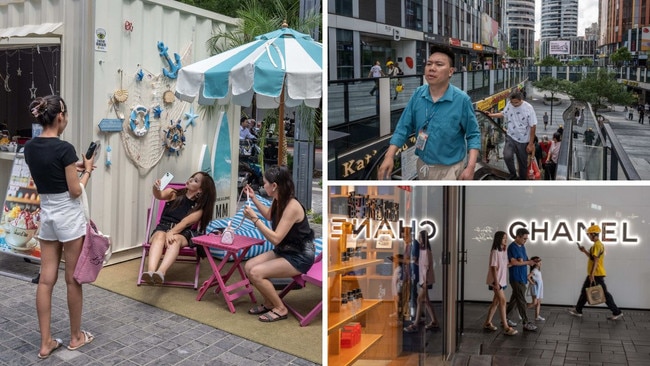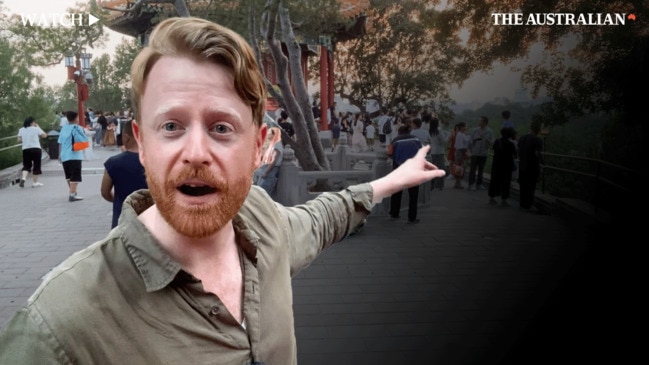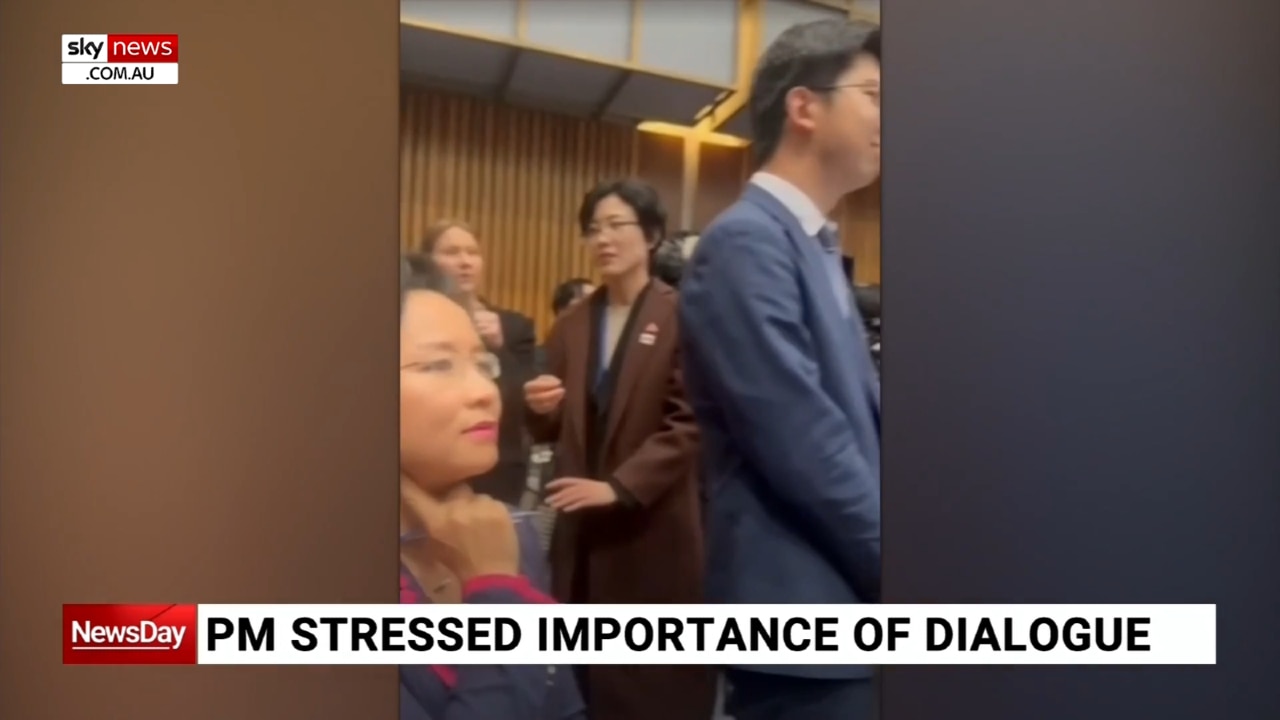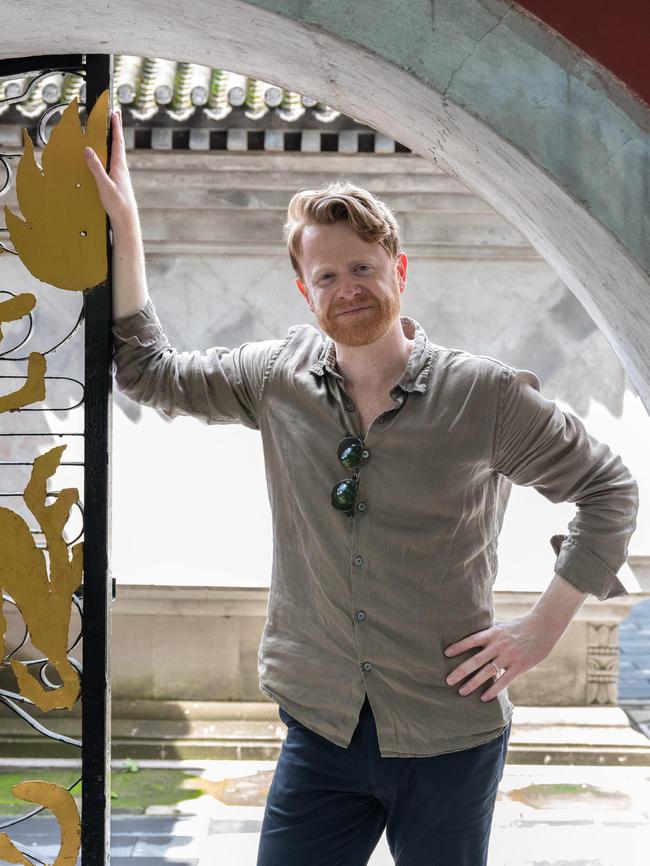Summer parties, icy meetings: the strange new normal of Australia-China relations
An Australian-themed knees-up on the Great Wall of China is a striking real world example of why officials privately say ‘project stabilisation’ with China has gone far better than they imagined.

You can now listen to The Australian's articles. Give us your feedback.
In two weeks time, Scott Morrison’s former AUKUS envoy is going to be one of the guests of honour at an Australian-themed knees-up on the Great Wall of China.
Joining Australia’s submarine sherpa-turned-China ambassador, Scott Dewar, for the 400-odd person black-tie party on the eye-popping location about an hour from Beijing will be senior diplomatic representatives from our Five Eyes partners, the US, Canada, UK and New Zealand. The Japanese ambassador is another special guest, making it something of a who’s who of the various “exclusive blocks” that, according to the complaints of Xi Jinping’s government, reveal Australia’s “Cold War mentality”.
Mingling with those representatives from Australia’s closest security partners at the “Ball on the Wall” will be some of the most senior figures in China’s business world along with Australian corporate guests, including executives from Treasury Wine Estates, owner of Penfolds and the biggest winner of the unwinding of most of Beijing’s trade blacklist.

Not long ago it would have been inconceivable for most of the Chinese guests to be seen anywhere near such a high-profile display of Team Australia.
“If we tried to do this when the bilateral relationship was – what’s a euphemistic way of saying what it was? – it wouldn’t be positive for those [Chinese business figures] to be associated with the chamber,” says Vaughn Barber, the chairman of AustCham Beijing, the host of the upcoming party.

It’s a striking real world example of why Australian officials privately say “project stabilisation” with China has gone far better than they imagined possible back when Anthony Albanese was sworn in as Prime Minister in May 2022.
Albanese’s trip to China in November was the watershed, Barber says. China flicked a bureaucratic switch, Premier Li Qiang dubbed the PM “handsome boy” and all of sudden Australian businesses were operating in a new business environment.
Right now feels like a “Goldilocks” moment for many Australian officials working on China policy. It’s not for nothing that new UK Prime Minister Keir Starmer has borrowed the Albanese government’s “co-operate where we can, disagree where we must” formula.
Negotiations are under way for Treasurer Jim Chalmers to fly to Beijing as early as next month to see senior Chinese financial officials and for insight into the concerning state of China’s iron-ore reliant steel industry, although Australian and Chinese officials are still in talks about the trip. The visit would follow those by Foreign Minister Penny Wong (who has visited twice since being sworn in), Trade Minister Don Farrell (twice) and the PM. It’s a roster and tempo that was unimaginable during the Turnbull-Morrison era.
For all the warm public smiles, behind closed doors Beijing remains an icy place for Australian officials. Dewar, who has previously served in Australia’s Beijing embassy in the pre-Xi era, took up his current position in January. The experienced diplomat is under no illusion that China’s change of approach with Australia has been tactical, not structural. A low ceiling for further progress hangs over the relationship while a host of potential pitfalls loom underneath it. “He’s pretty realistic about things,” says one person familiar with his daily grind.
More than two years into the ongoing “stabilisation” project, most of China’s biggest grievances remain. A few, such as Australia’s public comments about what Canberra has called China’s “dangerous and illegal actions” against The Philippines in the South China Sea, have gotten worse as Beijing’s dispute with Manila has escalated.
The Chinese retort by telling Australia officials to butt out of China’s region, adding that Canberra should be grateful Beijing has shown such restraint to date.
Outside strictly bilateral issues, Beijing’s machinery of government remains almost entirely closed to Australian officials. Even on things exclusively concerning Australia – the agenda for Chalmers’ still-to-be confirmed trip, for example – the Chinese government can be maddeningly difficult to engage with.
Even getting a meeting to discuss an issue, let alone securing an outcome in Australia’s interest on thorny issues like finding a way to end China’s four-year ban on Australian live lobster, remains an ordeal.
The behaviour of Chinese diplomats towards journalist Cheng Lei during Premier Li’s recent visit still has heads shaking in Australia’s diplomatic corps.

That said, Beijing has also been notably more forgiving of the Albanese government over what it perceives as grave Australian offences. The recent bipartisan motion concerning Taiwan’s status by Australia’s Senate would have triggered an eruption of fury in the Turnbull or Morrison eras. A week on, it has barely made a peep.
The Prime Minister has been open that Australia is feeling its way from here, a similar situation for most liberal-democracies dealing with China in 2024. “There is no fixed model for a stabilised relationship,” Albanese told Li in Canberra in June.
For now, with an US election looming and huge economic policy challenges at home, Beijing seems to have accepted the new dynamic equilibrium.
Most Australians have little idea about the tense conversations that take place behind closed doors, which leaves many scratching their heads. Quite reasonably many ask, is the relationship better or not?
Another complication is the enormous gulf between the Australian and official Chinese versions of what went wrong in the first place. Chinese officials still speak as if the 2018-22 breakdown was caused mostly by America, with a witless Australia being forced to take a host of “anti-China” positions.
Canberra’s insistence that it made up its own mind throughout – whether on 5G, foreign interference or AUKUS – is dismissed as a wizened teacher might an errant schoolkid trying to explain their absent homework. There remains no admission that China’s unprecedented military build-up has unnerved far more countries in the region than just Australia.

Days after I flew into Beijing to reopen The Australian bureau, ending a four-year forced hiatus, the Chinese foreign ministry was again denouncing Australia and its AUKUS partners. “Their moves exacerbate the arms race, undermine the international nuclear non-proliferation regime, incite bloc politics and military confrontation and hurt regional peace and stability,” said foreign ministry spokesman Lin Jian.
The China Daily again addressed the apparently incorrigible dullards from the south, urging the Albanese government to listen to the sage advice of trenchant AUKUS critic Paul Keating.
“Australia has nothing to gain but everything to lose by participating in the US-led strategy to counter China,” the China Daily instructed in an editorial.
None of this is to dismiss the real improvement in the environment for Australian businesses based in China. Instead of worrying about the bilateral relationship, they now sweat over wider geopolitics and China’s slowing economic growth, although many still see a huge market rich with opportunity.
Chinese businesses also are benefiting as they look for opportunities beyond their slowing local economy, which is beset with a property funk and the related deterioration of consumer confidence.
They also want to secure resources to fuel an economy that remains gargantuan and is forecast to grow another 5 per cent this year, despite its current troubles.
Meetings between them and their Australian counterparts are much more productive, business figures in China tell The Australian, particularly those concerning the green energy transition, which both Canberra and Beijing have made a leader level priority.
An emerging concern on the Chinese side is what might come next in Australia, says Barber, the chair of the Australian business chamber in Beijing. “That’s probably the top question I get asked from Chinese business people. How would the Australian-China relationship be impacted if there’s a change of government?”
Many are understandably raw after Australia’s about face on Chinese investment, which only a decade ago was still being feted by Canberra like few destinations in the world.
Publicly Opposition Leader Peter Dutton is trying to rebrand the Coalition as champions of trade with China, as he eyes a swag of crucial marginal seats. But just like Chinese officials, his tone is very different when the microphones are off. “In private, he hasn’t changed,” says a well-informed source.




To join the conversation, please log in. Don't have an account? Register
Join the conversation, you are commenting as Logout